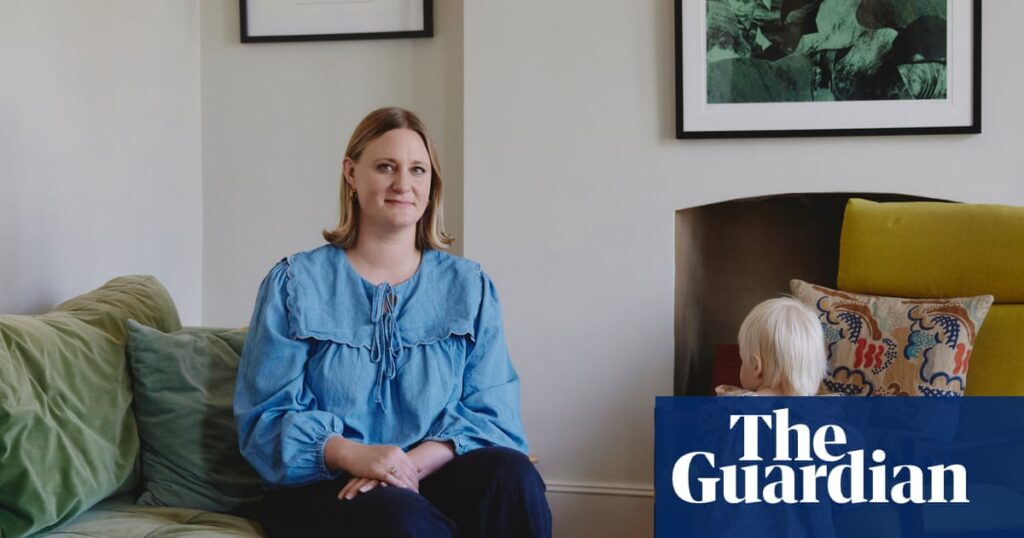It was in February of this year that I first noticed something wasn’t right. I was coming to the end of my maternity leave with my second child, and had recently retrained from being a wedding cake-maker to a food stylist, something I loved. As well as looking after two kids with my husband, Chris, I was picking up lots of work. I was probably juggling too much, but life was exciting.
That week, I’d just finished a big job and was exhausted. I began to notice flashing lights in my vision. I assumed it was a migraine from overworking – I used to get them as a teenager – and didn’t think too much of it.
The next day, we left London for the weekend to visit my parents. I woke up that morning and everything felt strange – overwhelmingly bright and vivid, as if someone had plugged an electric current into the world. It was like seeing through static.
I mentioned it to my husband and my mum, and they said it was probably a migraine. But the next day it was still there. It made me dizzy, and I started to feel uneasy.
A few nights later, as I was putting my son to bed, I couldn’t see his face properly. I started to get really upset. Was I gradually losing my sight? Surely not, at 39? I didn’t have a headache, so it didn’t feel like a migraine.
I went to A&E. The eye department said my eyes were fine, so I tried to put it out of my mind.
A few days later, I was working in a bright-white studio, and everything felt overwhelming again. I ended up back in A&E. Again, I was told everything was fine, and that it was probably a migraine and would pass.
But it didn’t. I began writing down my symptoms: intense after-images – bright shapes that lingered long after I looked away – and severe light sensitivity. In the evenings, when the light was low, I felt off-balance walking around. I had tremors in my hands and face, constant visual static and a horrible, thick brain fog.
I started to worry it was something serious to do with my brain. I booked a private neurologist, but the first appointment was six weeks away. So I booked an MRI, but it came back clear.
I began to second-guess myself. Did people think I was making all of this up? Was I? There was no obvious cause. Just this constant assault on my senses. I felt as if I was losing my mind.
Googling my symptoms, I came across something called visual snow syndrome. At first, it sounded like nonsense, this syndrome with a strange name and affecting about 2% of the UK population. But every post described what I was experiencing.
In April, when I saw the neurologist, she confirmed the diagnosis. There is very little knowledge about it and no known cure. She offered epilepsy medication, but as there was no guarantee it would help, I decided not to take it. The diagnosis was validating, but crushing. No one around me had heard of it. Even most doctors haven’t.
I’ve had to adjust my life in many ways. Some days are better than others – it depends on stress or how much sleep I’ve had. I wear sunglasses almost all the time – even indoors – because of the light sensitivity, which makes me feel like a bit of an idiot.
after newsletter promotion
I get overwhelmed easily. I recently went to a friend’s hen do and the venue had flashing lights, and I burst into tears and had to leave. I remember thinking, “I can’t even hang out with my friends and just feel normal.”
My four-year-old is slowly starting to understand. In the mornings, he usually likes to run in and throw open the blinds, but the other day he told Chris to keep them closed, because “Mummy’s eyes might hurt”. It’s devastating. I want to be present, to run around and play with my kids. It affects my sleep, too. I wake in the night, every night, with shaky hands, fuzzy vision and that same foggy heaviness in my head.
I’m looking into a clinical trial at St Thomas’s hospital in London. I’m also considering joining a support group through the Visual Snow Initiative in the US, to not feel so alone.
The uncertainty is hardest. Will it ever go away? Will it get worse? And the loneliness of it, because I look fine. I get on with things. I can still do my job. But I’m navigating this constant noise.
As told to Emma Loffhagen
Do you have an experience to share? Email experience@theguardian.com


